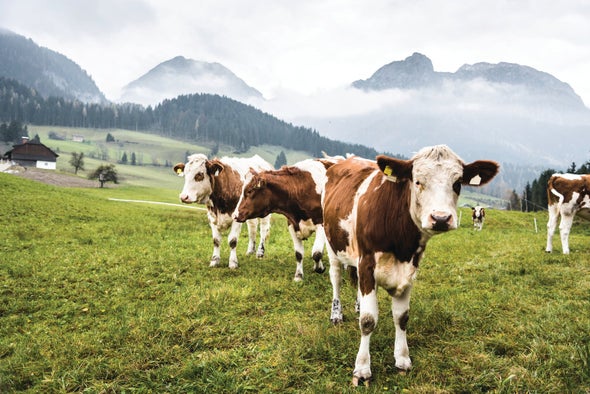Since antibiotic drugs were first used in farm animals in the mid-1940s, a debate has raged about the prudence of this practice. A study published last December in Ecology Letters adds a new wrinkle: Farmers often use manure to build up soil carbon and increase nutrient availability for plants, but the study showed that dung from dairy cows given two types of routine antibiotics also altered the composition of soil bacteria and fungi. These shifts affected how plants “fixed” carbon dioxide from the atmosphere to convert into organic matter—a process that figures into strategies for climate change mitigation.
Carl Wepking, now at Colorado State University, led the experiments as a graduate student at Virginia Tech. Every month he hauled trash bags of cow manure to a grassy field and sprinkled 648 grams per square meter of three manure types onto three plots. Several months into the experiment, he covered the plots with Plexiglas chambers for seven days and pumped in carbon dioxide labeled with a specific carbon isotope for tracking. In the control plot, Wepking says, the manure from untreated cows had an overwhelmingly positive effect, boosting plant growth and retaining newly photosynthesized carbon in the plants and soil microorganisms. But in the plots with manure from antibiotic-treated animals, more carbon was released again as carbon dioxide—roughly twice as much for one of the antibiotics. “Whether or not you give cows an antibiotic changes how carbon moves within the plants themselves,” he says, “which is wild.”
Soil stores about twice as much carbon as the atmosphere does, and increasing that storage could help address climate change. Francesca Cotrufo, a soil ecologist at Colorado State, who was not involved in the study, says climate and carbon-sequestration models increasingly account for the role plant compounds play in how efficiently microbes store carbon in the soil. Although the manure study does not account for carbon already stored, she adds, investigating antibiotics’ effects on more recently fixed carbon is a “novel and interesting angle” that “definitely should receive attention.”
Wepking suggests that because two different antibiotics (with different mechanisms of action) both reduced carbon-use efficiency, administering this category of drug to cows could potentially negate manure’s climate benefits. “What we’ve shown so far is that the positive effects of adding manure to the soil aren’t as positive as they looked, if your manure is coming from cattle that have been given antibiotics,” he says—although “it’s still kind of hard to tell” whether medicating livestock neutralizes or negates any net carbon-capture benefits of manure fertilizers. But it is critical to find out, he adds: U.S. livestock may contribute up to 13 million kilograms of antibiotics to the environment every year, and that figure is expected to increase.

